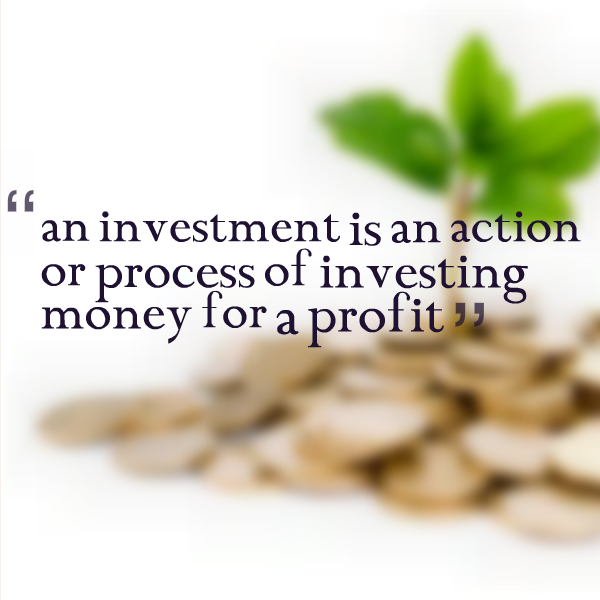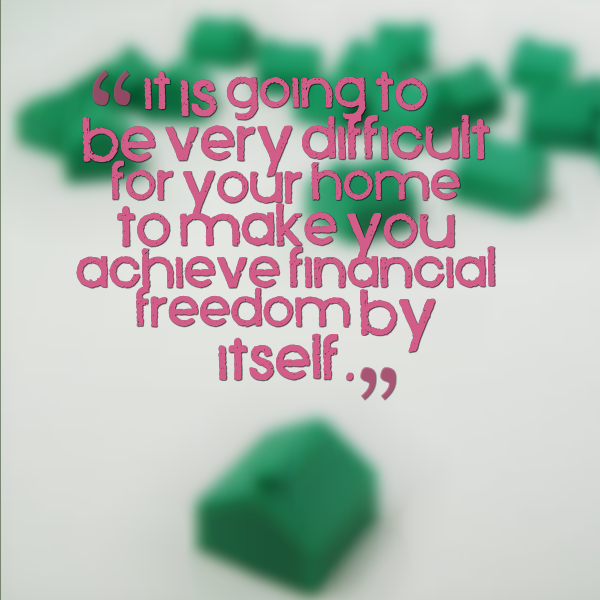Is Your Home An Investment? (Ep114)
There is huge debate among the investment community as the whether your home, your principle place of residence is an investment or if it isn’t.
Is Your Home An Asset?
Robert Kiyosaki who is the author of ‘Rich Dad, Poor Dad‘ caused a lot of controversy when he released his book because in his book he said the your home is not an asset. And a lot of people blew up about this and said “yes my home is an asset! It’s an investment.”
It’s probably the most expensive thing you will ever own and it is probably going to increase in value significantly over time. So let’s answer the question is your home an investment?
The Definition of Investment

So to find out whether or not our home is an investment I think it is a good idea to go to dictionary and find out what an investment is.
And Wikipedia says ‘an investment is an action or process of investing money for a profit’.
We need to look at whether or not our home creates profit to start with and then we need to look at our motivations.
Are we actually investing in a home to gain a profit or are we purchasing a home for other reasons?
Does Your Home Create A Profit?
In most cases I believe the answer is yes. Your home creates a profit for you in three ways.
The first way is through cost savings.
If you live in an area with low rental yields then the chances are that by purchasing a property today you are going to paying more in mortgages and expenses than you would be if you rented that property. But that is not the case for all the suburbs and that is not the case for all time.
What will happen over time is that the rent will continue to increase due to supply and demand and inflation. And your mortgage will stay relatively the same or will actually decrease as you begin to pay it off.
Your mortgage payments if you refinance may become smaller or eventually you may pay off your mortgage completely and not have that expense anymore. And when that happens you are going to move into a situation where you’re not paying as much for your mortgage and your house expenses as you would be paying if you were renting a property. And so this creates cost savings for you.
While not technically a profit, this cost savings help to lower the overall cost of your lifestyle can help you achieve financial freedom quicker. And there are a lot of investors out there who are purchasing investments purely for the cost savings or for the tax benefits that they provide. So I believe that these cost savings is an element of your home being an investment.
The second way is through an increase In Value (capital growth)
The second way to gain a profit from your home is by the increase in value of that property. So over time house prices in Australia tend to go up. So over time it’s very likely that your property is going to continue to increase in value and create equity for you.
But that equity isn’t necessarily profit unless you can access it. You can access than in two ways, you can access it by taking an equity loan and by getting an extra loan against that equity to then use to go ahead and reinvest. Or you could sell your property and realise the gain that it has achieved.
If you are going to sell the property – then you need to downsize if you are going to actually achieve any of those gains or you need to move into a rental because otherwise you are just going to move from the one property the another. If you are paying the same you are not really seeing any of that finance come your way.
The third way is to rent out a portion of your home
The third way your property can create a profit (which is a lot less common) is by actually renting out a portion of your home to a tenant and then getting income coming in. If you go back to yesterday’s episode where I interviewed Wally Gabrael who is from GrannyFlatSolutions.com.au and we go through the step by step process to build a granny flat on your property.
And just to give you an idea you can build a granny flat for as little as a around a $100,000 and in as little as five months from the day you decide to build a granny flat to the date the tenant moves in. So that can be a great way to get a profit from your property.
As we can see in a lot of cases your home is going to generate a profit in one way or another.
I think that there’s a more important question to ask.
Rather than asking the question “is your home an investment” which is a very technical question. We can look at it and we can say “well yes according to the dictionary our home is an investment” or “no, according to the dictionary our home isn’t an investment”.
But dictionary definitions don’t always help us achieve success in life. And I come back to Robert Kiyosaki’s book ‘Rich dad poor dad‘ because he redefined the term assets and liabilities which again created a lot of controversy.
He said that an asset is something that puts money into your pocket each month so it generates you passive income and liabilities are stuff that take money out of your pocket each month. So the things that you need to pay for.
Better Question: “Will Your Home Make You Financially Free?”

By redefining what an asset is and what a liability is allows your mind to start thinking more creatively to move you towards your financial goals. And so while Robert’s Kiyosaki’s definition of an asset and liability may not be technically correct according to the dictionary. It actually helps you achieve your goal of financial freedom – whereas the traditional definition of an asset and liability actually makes it harder for you to achieve financial freedom.
Rather than focusing on a term being right or wrong, I think a better question to ask is ‘will your home make you financially free’?
Now that is a very interesting questions to ask and something very interesting to think about. The fact of the matter is it is going to be very difficult for your home to make you achieve financial freedom by itself.
Now as we already discussed, the home may be able to lower your living expenses especially if you get your mortgage fully paid off but in terms of actually supporting your lifestyle and fully supporting your lifestyle so you don’t have to work or so you don’t need to rely on a pension, a home is very unlikely to do that.
You Can Use Your Home As An Leverage To Invest
However you can use your home as leverage to go ahead and invest. You could access equity and use that as a deposit on future properties, hopefully positive cash flow properties that generate a passive income.
You are going to have to have other investments outside of your home( in almost every case) in order to achieve financial freedom.
So even though technically your home is an investment it’s better to ask whether will actually help you achieve financial freedom and is your home is going to move you towards your goals.
Today’s episode sponsored by Own Your Own ATM – Guaranteed rental returns of 20% p.a. or $0.30 per transaction, whichever is HIGHER! This can be a great way to inject cash flow into your investment portfolio.
DISCLAIMER No Legal, Financial & Taxation Advice
The Listener, Reader or Viewer acknowledges and agrees that:
- Any information provided by us is provided as general information and for general information purposes only;
- We have not taken the Listener, Reader or Viewers personal and financial circumstances into account when providing information;
- We must not and have not provided legal, financial or taxation advice to the Listener, Reader or Viewer;
- The information provided must be verified by the Listener, Reader or Viewer prior to the Listener, Reader or Viewer acting or relying on the information by an independent professional advisor including a legal, financial, taxation advisor and the Listener, Reader or Viewers accountant;
- The information may not be suitable or applicable to the Listener, Reader or Viewer's individual circumstances;
- We do not hold an Australian Financial Services Licence as defined by section 9 of the Corporations Act 2001 (Cth) and we are not authorised to provide financial services to the Listener, Reader or Viewer, and we have not provided financial services to the Listener, Reader or Viewer.
"This property investment strategy is so simple it actually works"
Want to achieve baseline financial freedom and security through investing in property? Want a low risk, straightforward way to do it? Join more than 20,000 investors who have transformed the way they invest in property."
